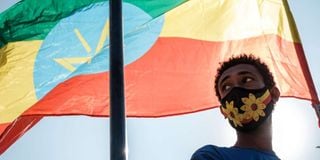Premium
Ethiopia denies claims of Uganda mediation in Tigray conflict

A youngster stands below an Ethiopian national flag during a blood donation rally organised by the city administration of Addis Ababa, in Addis Ababa, on November 12, 2020.
What you need to know:
- A statement from the Emergency Task Force on Tigray said the reports were “inaccurate and not substantiated”.
- Claims of mediation emerged on Sunday after some Ugandan officials told AFP news agency that President Museveni had planned to host the two sides.
The Ethiopian government on Monday refuted claims of planned talks with the Tigray People’s Liberation Front, mediated by Ugandan President Yoweri Museveni in Kampala.
A statement from the Emergency Task Force on Tigray, a team put together by the Ethiopian government to manage the crackdown on the TPLF, said the reports were “inaccurate and not substantiated”.
Redwan Hussein, the spokesperson for the task force, said Addis Ababa will continue with the crackdown on errant TPLF members to ensure they face the law.
“The federal government is committed to upholding the rule of law in Tigray Region,” he said.
TPLF unaware
Claims of mediation emerged on Sunday after some Ugandan officials told AFP news agency that President Museveni had planned to host the two sides for a possible dialogue.
In fact, TPLF President Debretsion Gebremichael also indicated on Monday that he was not aware of an invitation to dialogue in Kampala, although the TPLF itself has not said if it will reject such an offer.
The Ethiopian government of Prime Minister Abiy Ahmed has repeatedly said it will not negotiate with TPLF “criminals”, whom it accuses of atrocities on civilians, corruption and other crimes including treason.
On November 4, Dr Abiy ordered a military operation on the TPLF, accusing the erstwhile ruling party of attacking and looting weapons from the northern command of the Ethiopian National Defence Force.
The incident seemed to cement hostilities between the TPLF, which ruled Ethiopia for three decades to April 2018, and Abiy, whose radical reforms, including a proposal to dissolve TPLF into a common, non-ethnic party, have been opposed sabotaged by the TPLF.
International pressure
But Abiy has also faced pressure from other international players to sue for dialogue, especially after it emerged 26,000 people have fled to Sudan seeking refuge.
Amnesty International also revealed on Thursday that some hundreds of unarmed civilians had been massacred by the militia in Tigray, although it could not determine whether those fighters were allied to the government or the TPLF.
Abiy, however, said the TPLF had killed civilians and cited the AI report as part of the proof.
“Such horrendous attacks on civilians perpetrated by the TPLF is an abominable transgression that the international community not only needs to take note of, but also condemns in the strongest terms possible.
“The international community should also support the federal government in its efforts to bring the perpetrators of such gruesome crimes to justice,” the PM said on Sunday, arguing his government will not desire an external intervention in the conflict.
Ethnic tensions
The TPLF led Ethiopia for three decades, helping improve its economy, but also left in its wake ethnic tensions and claims of atrocities especially on those who did not toe the line.
Abiy, an ethnic Oromo (born of an Amhara mother), came to power largely as a consensus candidate following protests especially in his native Oromo region.
But he has been at loggerheads with the TPLF, who now see him as an illegitimate leader.
On Sunday, the US criticised the TPLF for launching rockets on Asmara, the capital of Eritrea.
Tibor Nagy, the US Assistant Secretary of State for Africa, said the front was attempting to “internationalise” the conflict in Ethiopia.
However, Debretsion had accused Eritrea of launching attacks on Tigray and offering Ethiopian jets a launchpad for attacks on Tigray. Eritrea has denied involvement.





